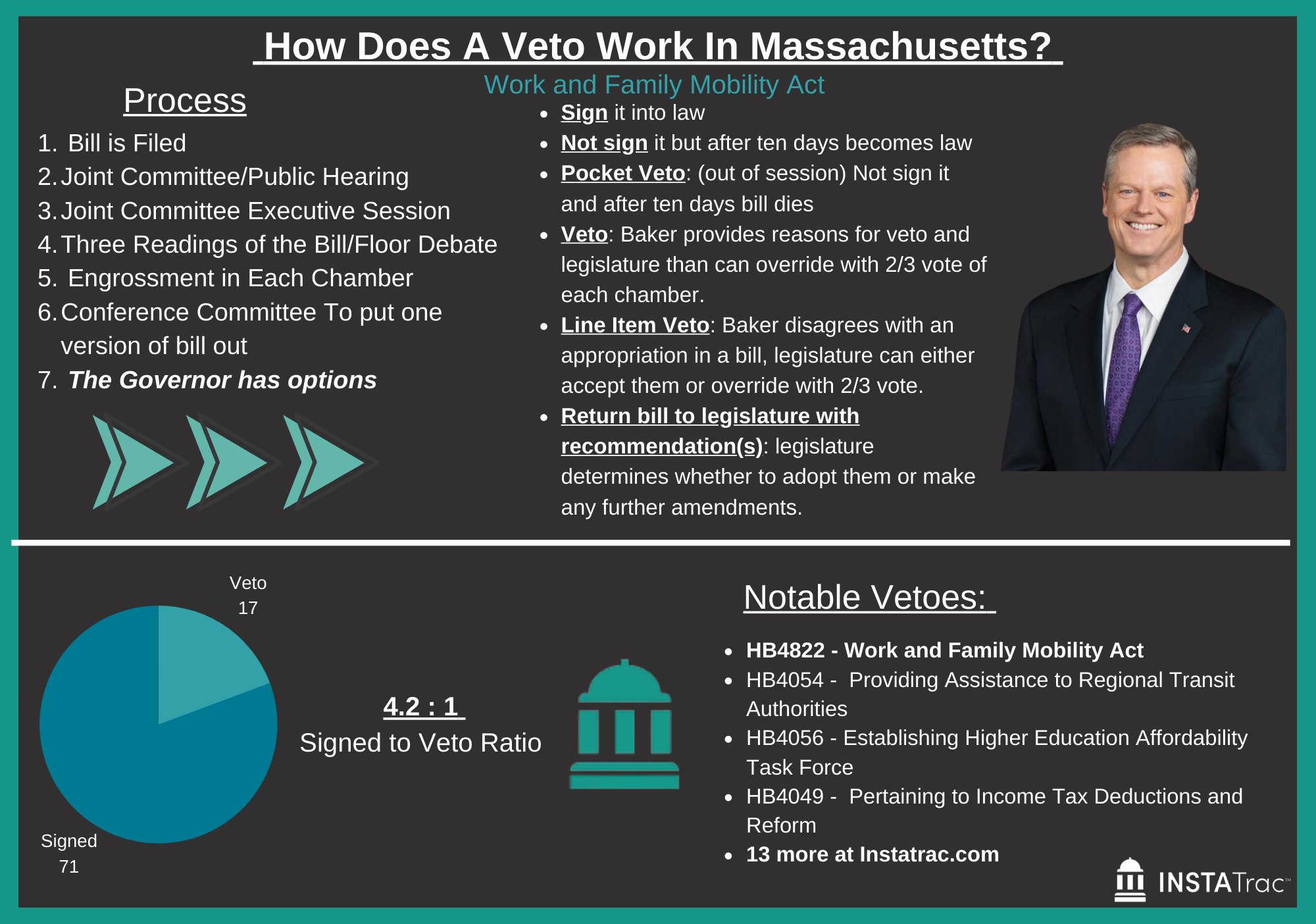The Power of Veto
Across most levels of government in the U.S., the executive branch holds significant powers that do not exist in other branches. This rings true in Massachusetts, where the governor has a number of privileges, one of the most known being the power of veto. Though many may already be aware that a veto is an executive’s power to reject a bill and send it back to the legislature, very few citizens understand the different types and frequency of vetoes in Massachusetts. In looking at Governor Baker’s actions of the past session, certain trends in his use of vetoes are apparent.
First, before understanding the different types of vetoes in Massachusetts, it is important to understand the vast amount of work that goes into a bill before it reaches the Governor’s desk. As shown by the graphic above, there is a six step process, often involving hundreds of advocates, researchers, and legislators in order to produce the legislation for step 7. In spite of this, the governor cannot merely act as a rubber stamp for approval, which is why there are five primary actions that can be taken.
Two of the most frequent actions the Baker administration has made this session are to either sign bills into law or return bills to the legislature with recommendations. With two months to the end of the formal session, Governor Baker has already signed 71 bills into law, including legislation expanding access to adoption, improving care for K9 officers, and many home rule petitions. However, the governor has also been quick to veto bills, even when they have had overwhelming support in the Commonwealth.
There are three main types of vetoes which Governor Baker can use. The least common of these is the pocket veto, often because it is used at the beginning of a new session to reject existing bills from the previous one. Pocket vetoes can also be more of a declarative statement for the Governor’s policy, as one of the two used this session was to reject the climate road map bill from 2019-2020. Line item vetoes are the next most common, but are typically used on the general appropriations act and supplemental/capital budgets. As a result, line item vetoes usually do not intend to destroy legislation but rather tweak it, leading to more dialogue between the two branches. Lastly, there is the general veto power, by which the governor sends the bill back to the legislature, where it must receive a two-thirds vote in each chamber in order to be overridden and made into law. Thus far, Baker has outright vetoed 17 bills this session, including perhaps most controversially, the Work and Family Mobility Act (HB4805) last week.
Interestingly, over 80% of Baker’s vetoes this session have been general vetoes. In the cases where vetoes were used, the governor provided an array of explanations, but there is a general pattern for vetoed bills. The majority of these 17 bills seem to change taxes, reform state program eligibility, or establish special commissions across different issue areas. The Governor has also rejected a number of revenue positive bills though, including the work and family mobility act, the institution of parking fees on DCR roads, and more. Taking this into consideration, Baker appears to be somewhat selective over his use of vetoes, reserving the power for those issues he is staunchly against.
Unsurprisingly, each of the bills that have been vetoed by Baker have since also been overridden by both houses in Massachusetts. As the legislature plans to address Baker’s veto of the Work and Family Mobility Act in the coming weeks, many don’t want to miss what happens. With InstaTrac, you don’t have to! Our service allows you to track and receive alerts on any bill of interest, including if it’s been vetoed or overridden. For more information or to see a demo of our services, please reach out to info@instatrac.com.
Never miss a blog post - and stay on top of what’s happening on Beacon Hill! Follow us on Twitter, Linkedin, or Instagram.

